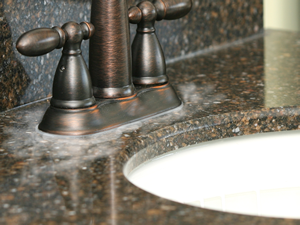If you have white residue on your stone, here are a few tips and tricks for identifying the cause and possibly removing it.
First, take a close look. If the substance can be scraped into shavings, it may be an accumulation of cosmetics, soaps, cleaning products, or hard water build up. If it is powdery, then it is likely efflorescence.
Accumulation of Cosmetics, Soaps, or Cleaning Products
Here’s a quick and easy test that can tell you whether the white residue on your stone is an accumulation of cosmetics, soaps, or cleaning products. Use a nylon pan scraper or a razor blade to carefully scrape the residue. If it can be easily removed, then you are dealing with dried products on the stone. The shavings will either be soapy when water is introduced or smeary or oily if it is conditioner, lotions, or hair treatments.
Hard Water Build Up
Like the test above, hard water deposits can be scraped away, but only with significantly more difficulty.
Efflorescence
The good news about efflorescence is that most of the time, it is a minor inconvenience that can be remedied without having to replace the stone. When moisture evaporates from the stone, it leaves behind salts and minerals. The stone will need to be periodically professionally cleaned, but eventually all the moisture will dissipate and the efflorescence problem will disappear.
The bad news is that every now and then, efflorescence is just the visible symptom of a much bigger problem underneath the stone — moisture in the substrate. An experienced stone restoration contractor can determine whether the stone can be restored or if it will have to be replaced.
Getting Rid of the Residue
If you want to attempt to remove product residue or hard water build up yourself, spray the stone with a pH-neutral, stone-safe cleaner and allow ample dwell time to soften the residue. Then using gentle pressure and a white Scotch Brite pad or a Dobie pad, clean the stone. If you see a difference, then you should be able to rinse and repeat this cleaning process until all the residue is removed.
For stubborn residue, you may be tempted to use a stronger cleaning agent or a heartier scrubbing pad, but doing so may do more harm than good. Calcium-based stones can etch if you use the wrong chemicals and the finish on soft stones can be scratched if the abrasive is too hard. It may be best to call a stone care professional rather than cleaning the stone yourself.
This is one of a series of articles written and published on behalf of Stone and Tile PRO Partners.



